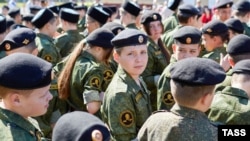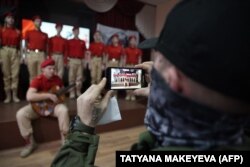A state-run outfit is conducting “neuroprofiling” tests on 10,000 children and teens to identify leaders and “anti-leaders” in a bid to boost patriotism and funnel young people into roles the results suggest they fit.
If it sounds like 1984 or some dystopian future, it’s not.
It’s Russia in 2025 -- a time when President Vladimir Putin, who has pulled his country into a devastating war against Ukraine and a mounting confrontation with the West, is seeking to foster patriotism and crush dissent.
Launched by Rospatriottsentr (Russian Patriot Center), part of the state agency for youth affairs, the goal of the federally funded profiling project is “the upbringing of harmoniously developed people,” according to documents on a government procurement website that were examined by Systema, RFE/RL’s Russian investigative unit.
Independent educators criticized the program, with one telling Systema it was harnessing “pseudoscience” for the purpose of “manipulation” and had echoes of both communism and fascism.
“It is yet another attempt by the authorities to control people and influence their decisions,” said educator Dima Zicer.
The 12-to-18-year-olds being tested come from several Russian regions. The program runs into August and 50 participants "with a pronounced positive profile" will be selected to take part in a five-day seminar in September in Sevastopol, on Ukraine’s Russian-occupied Crimean Peninsula, according to the documents reviewed by Systema.
Such a profile, however, may not translate into patriotism or loyalty, a description of the seminar on the procurement website suggests. Organizers will seek to identify "leaders and/or anti-leaders (participants prone to destructive behavior)," it said, and participants who "defame the ideas of patriotism" will be immediately removed from the event.
The aim of the program is the “transformation of approaches to education, career guidance, and the patriotic upbringing of young people,” Rospatriottsentr said on its Telegram channel.
Where participants might ultimately go as a result of the project is unclear.
However, officials in the Siberia region this week unveiled plans for a $65 million youth center -- to be named the Youth Palace -- aimed at promoting patriotic education and state-approved values among Russian children and teenagers.
Vladimir Kozlov, the head of Persona, a Russian company that sells “neuroprofiling” tests and is a partner in the project, refused to answer questions sent by Systema via Telegram. Rospatriottsentr did not respond to a request for comment.
The organizations involved have also provided few details about the testing methods employed in the study.
Conclusions On Patriotism
Conclusions are drawn about participants based on "various subconscious cognitive perceptions of visual symbols," Persona said in a presentation.
"We are convinced that patriotism begins with understanding one's role in the future of the country,” Kozlov said in remarks posted on Rospatriottsentr’s Telegram channel. “Our company's neuroprofiling technologies help teenagers find this role -- accurately, consciously, and with motivation.”
A Moscow-based child psychologist who spoke to Systema on condition of anonymity for security reasons said there are “hundreds of neuroprofiling methods that have been proven to be reliable,” include questionnaires and “classic Rorschach inkblots.”
“These tests can tell you a lot about a person: whether they have leadership qualities, how submissive they are, whether they speak sincerely or repeat what they think others want to hear from them,” the child psychologist said. “The question is how it is used and for what purpose.”
Zicer disagreed, asserting that “neuroprofiling is pseudoscience” and calling efforts to identify potential leaders or channel teenagers into a particular profession or pathway in life “manipulation.”
“It’s very convenient for the state to give a person a kick at the age of 14 so that he flies along the proposed trajectory until his grave,” he said, suggesting that the state should be doing the opposite –- opening as many pathways as possible.
“The function of the educational system is to make sure that a wide variety of talents can be expressed. But the choice [of which trajectory to follow] is on the individual's side. And that is the basis of critical thinking,” Zicer said.
Under Putin, president or prime minister since 1999, the Kremlin has made it clear that it is not interested in fostering critical thinking. Putin stepped up efforts to stifle dissent and silence independent voices when he returned to the presidency in 2012, and the clampdown has accelerated since he launched Russia’s full-scale invasion of Ukraine in 2022.
The government has been seeking to instill patriotism in children since Putin’s first term. Critics say it has used tools ranging from history textbooks to militaristic classes to press young people to accept the Kremlin’s geopolitical narratives and support the war against Ukraine.













